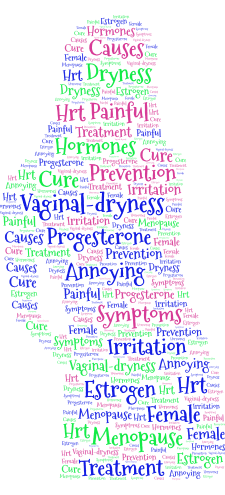
Genitourinary symptoms of menopause can affect up to 50% of postmenopausal women with vaginal dryness being one of the main symptoms. Vaginal itching, irritation and pain during intercourse are the other common symptoms which mainly occur due to vaginal dryness.
What causes vaginal dryness during menopause?
Estrogen.
Menopausal changes in the vaginal and urinary system are due to decreasing levels of estrogen.
The vaginal outer layer of skin contains estrogen receptors. Estrogen hormone binds to these receptors and maintains the thickness and elasticity of the vaginal skin wall. Estrogen helps to maintain the clear lubricating layer of fluid on the walls of the vagina and keeps it moisturised. Decreased levels of estrogen disrupt the tissue integrity making it thinner and less elastic (also known as atrophic vaginitis) and causes dryness of vagina and vulva.
Menopausal women are more susceptible to urinary tract infections since low estrogen levels with other factors increase the pH of vagina making it more alkaline. (Normally vaginal pH is acidic).
Mechanical damage due to scratching and irritation may increase the chances of infection.
Other factors such as reduced fatty tissue in vulva due to ageing make skin more sensitive and cause chafing due to dryness. A weaker pelvic floor can make bladder control difficult and causes frequent urination.
What are other causes of vaginal dryness?
There are several other reasons which can contribute to the vaginal dryness. They can be further divided into hormonal and non-hormonal causes as follows.
Hormonal causes
Estrogen levels can be affected by
- Giving birth and breastfeeding
- Cancer treatments such as chemotherapy and radiation
- Removal of ovaries due to medical reasons
- Anti-estrogen medications
Non-hormonal causes
- Sjogren’s syndrome which is an autoimmune disorder attacking moisture producing cells in the body. The most common manifestation is dry eyes.
- Medications such as certain antidepressants, antihistamines and cold medications causing overall dryness
Douching - An absence of enough foreplay before intercourse
Vaginal dryness can be awfully uncomfortable doesn’t matter what the cause of it.
Burning and itching due to dryness can be very irritating for some women. Painful intercourse due to these symptoms may decrease libido and create fear.
Vaginal symptoms of menopause often tend to persist after menopause and progress with time than being only associated with general ageing.
What are the symptoms of vaginal changes?
- Localised dryness leading to irritation, itching, burning, chafing causing discomfort
- Decreased vaginal secretions lead to pain and redness during sexual intercourse.
- Skin thinning may injure the vagina easily and may lead to light bleeding as well as increases chances of urinary tract infection. Bleeding of any sort needs urgent medical attention.
- Changes in vaginal pH may cause malodorous discharge. This needs to be investigated to exclude possibilities of vaginal or urinary tract infection.
How to prevent vaginal dryness?
Reducing vaginal irritation is the key to prevent vaginal dryness.
Follow these steps to reduce the vaginal irritation.
- Choose soft cotton underwear and change it daily. Limit use of tight-fitting underwear, tights, pantyhose and trousers as they increase sweating in private parts and cause irritation.
- Reduce time in damp or wet swimwear or active wear.
- Use low-allergenic washing products for clothes with no perfume. Rinse twice if required.
- Avoid scented sanitary pads, tampons, soaps or lotions and bubble baths around the vaginal area.
- Avoid or limit the use of hygiene sprays or douches. Preferably wash vaginal skin with plain water only without any soap. Pat dry rather than rubbing which may increase irritation.
- Avoid waxing and shaving while having symptoms.
- Use a suitable vaginal lubricant or moisturiser during intercourse to reduce symptoms. Try to be relaxed before engaging in sexual activity.
- Quitting smoking may help.
- Avoid scratching the area if symptoms persist, consult your doctor for further discussion.
How to treat vaginal dryness?
Non-prescription treatments for vaginal dryness:
- Non-hormonal vaginal moisturisers may help to restore moisture in vagina reducing discomfort.
- Some commercially available preparations can help to restore pH balance.
- Pelvic floor exercises may help.
Do not use products with local anaesthetics, disinfectants or essential oils unless advised by your doctor. Some of these can cause contact dermatitis and may worsen symptoms. Local anaesthetics may mask any underlying symptoms which may require medical attention.
Prescription treatment if other measures do not help:
The most common treatment option is usually the topical estrogen to replace some estrogen hormone in your body. Topical estrogen doesn’t absorb in the body as much compared to oral estrogen and works locally to relieve vaginal symptoms.
In Australia, topical estrogen comes as cream and pessaries and requires a prescription from doctor.
However, any vaginal estrogen product can have side effects, such as mastalgia (breast pain) and vaginal bleeding.
There may be contraindications with use of topical estrogen in some women such as:
- who have a history of endometrial cancer
- women with breast cancer who are taking an aromatase inhibitor
- undiagnosed vaginal bleeding
- pregnant or breastfeeding women
Women with severe vasomotor symptoms may get prescribed oral hormone replacement therapy by a medical practitioner.






